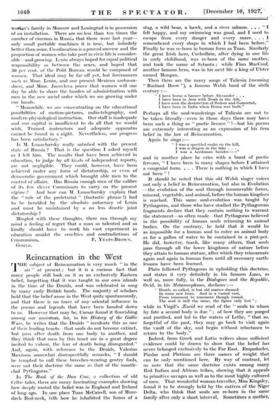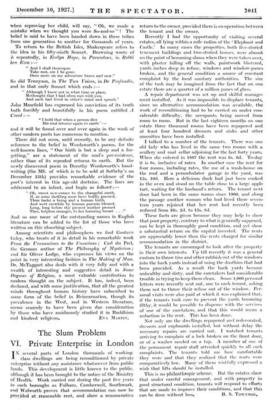Reincarnation in the West
IHE subject of Reincarnation is very much "in the 1. air" at present ; but it is a curious fact that many people still look on it as an exclusively Eastern belief, forgetting that it was taught in our own islands in the time of the Druids, and was celebrated in song by many early British bards. The majority of scholars hold that the belief arose in the West quite spontaneously, and that there is no trace of any oriental influence in the poems and legends that have been handed down to us. However that may be, Caesar found it flourishing among our ancestons, for, in his History of the Gallic Wars, he writes that the Druids " inculcate this as one of their leading tenets—that souls do not become extinct, but pass after death from one body to another, and they think that men by this tenet arc in a great degree incited to valour, the fear of death being disregarded." And, again, with reference to the Druids, Valeritts Maximus somewhat disrespectfully remarks, "I should be tempted to call these breeches-wearing gentry fools, were not their doctrine the same as that of the mantle- clad Pythagoras."
In The Book of the Dun Cow, a collection. of old Celtic tales, there are many fascinating examples showing how deeply rooted the belief was in England and Ireland of long ago. 'In one place Titan -McCairell, son of Mute- daeh Red-neek, tells how he inhabited the forms of a stag, a wild boar, a hawk, and a river salmon. . . . "I felt happy, and my swimming was good, and I used to escape from every danger and - every snare. . . . I remembered every shape in which -I- had been before." Finally he was re-born in human form as 'Than. Similarly the great Irish hero,. Cuchullain, after dying in one life in early chiklhood, was re-born of the same mother, and took the name of Setanta ; while Finn MacCoul, another famous hero, was in his next life a king of Ulster named Mongan.
Then there are the many songs of Taliesin (meaning "Radiant Brow "), a famous Welsh bard of the sixth century :— "I have borne a banner before Alexander . . . I have been in Asia with Noah in the Ark, I have seen the destruction of Sodom and Gomorrah, I have been in India when Roma was built."
Perhaps all the soul-wanderings of Taliesin are not to be taken literally—even in those days there may have been such a thing as "poetic licence" !—but his poems arc extremely interesting as an expression of his firm belief in the law of Reincarnation.
Again he sings :— " I was a speckled snake on the hill, I was a dragon in the lake . . .
I was a herdsman besides "
and in another place he cries with a burst of poetic fervour, "I have been in many shapes before I attained a congenial form. . . . There is nothing hi which I have not been " !
It should be noted that this old Welsh singer voices not only a belief in Reincarnation, but also in Evolution —the evolution of the soul through innumerable forms, mineral, vegetable, and animal, before the human kingdom is reached. This same soul-evolution was taught by Pythagoras, and those who have studied the Pythagorean fragments declare that they contain nothing to warrant the statement—so often made—that Pythagoras .believed in the possibility of human souls returning to animal bodies. On the contrary, he held that it would be as impossible for a human soul to enter an animal body as for a gallon of water to be contained in a pint-pot. He did, howeirer, teach, like many others, that souls pass through all the lower kingdoms of nature before they attain to human stature, after which they reincarnate again and again in human form until all necessary earth- lessons have been learned.
Plato followed Pythagoras in upholding this doctrine, and states it very definitely in his famous Laws, as well as, more fully, in the Dialogues and the Republic.
Ovid, in his _Metamorphoses, declares :— " Death, so-called, is but old matter dressed
In some new form. And in a varied vest, From tenement to tenement though togged,
The soul is still the same, the figure only lost " ; while in Virgil's lEneld we read of the "souls to whom by fate a second body is due " ; of how they are purged and purified, and led to the waters of Lethe, "that so, forgetful of the past, they may go back to visit again the vault of the sky, and begin without reluctance to return to the body."
Indeed, from Greek and Latin writers alone sufficient evidence could be drawn to show that the belief has never belonged exclusively to the Far East. Empedocles, Pindar and Plotinus are three names of weight that can be only mentioned here. By way of contrast, let us note that the same doctrine exists among many Red' Indian and African tribes,' showing that it appeals to primitive savages as well as to the" most highly cultured of men. That wonderful woman-traveller, Miss Kingsley, found' it to be strongly held by the natives Of the Niger Delta, who think that souls are re-born in the same family after only a short interval, Sometimes a mother, when reproving her child, will . say, "Oh, we made ; a mistake' when we thought you were So-and-so " ! The -belief is said to have been handed down in these tribes from one generation to another for thousands of years.
To return to the British Isles, Shakespeare refers to the idea in his fifty-ninth Sonnet.. Browning Wrote of it repeatedly, in Evelyn Hope, in Paracelsus, in Rabbi .ben Ezra :— " And I shall thereupon Take rest, ere I be gone.
Once more on my adventure brave and new."
So did Tennyson, in The Two Voices, in De Prol'undis, and in that early Sonnet which ends :— " Although I knew not in what time or place, Methought that I had often met with you,
And each had lived in other's mind and speech."
John Masefield has expressed his conviction of its truth both forcibly and beautifully in his poem entitled A Creed "I hold that when a person dies
His soul returns again to earth
and it will be found over and over again in the work of other modern poets too numerous to mention.
There did not seem, until recently, to be any definite reference to the belief in Wordsworth's poems, for the well-known lines, "Our birth is but a sleep and a for- getting," are a statement of the soul's pre-existence, rather than of its repeated returns to earth. But the newly discovered poem in Dorothy Wordsworth's hand- writing (the MS. of which is to be sold at Sotheby's on December 15th) provides remarkable evidence of the poet's interest in this age-old doctrine. The lines are addressed to an infant, and begin as follows :— " Oh, sweet new-corner to the changeful earth, If, as some darkling seers have boldly guessed, Thou hadst a being and a human birth, And wert erewhile by human parents blessed, Long, long before thy present mother pressed Thee, helpless stranger, to her fostering breast . . ."
And so one more of the outstanding names in English literature can be added to the list of those who have -Written on this absorbing subject.
Among scientists and philosophers we find Gustave Geley, who treats of it in detail in his remarkable work From the Unconscious to the Conscious;. Carl du Prel, the German author of The Philosophy of Mysticism ; and Sir Oliver Lodge, who • expresses his views on the point in very interesting fashion in The Makingof Man. Dr. McTaggart also deals with it very fully mid with a wealth of interesting and suggestive detail in Some Dogmas of Religion, 4 most valuable Contribution to modern thought on the subject. It has, indeed, been declared, and with some justification, that all the greatest minds throughout human history have subscribed to some form of the belief in Reincarnation, though its prevalence in the West, and in Western literature, seems scarcely- to have been -given due consideration bY those who- have assiduously Studied it in Buddhism











































 Previous page
Previous page